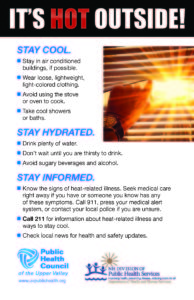It’s Hot Outside! Reducing Heat-Related Illness
 Reducing Heat-Related Illness in Older Adults
Reducing Heat-Related Illness in Older Adults
As the temperature goes up, so do the risks of getting sick from being too hot. Temperatures as low as 75 F can contribute to heat-related illness, particularly among those who are active and for some people with special needs. Temperatures inside can also be much higher than temperatures outside, especially if homes are not air conditioned or well managed for maximum cooling.
TIP: During an extreme heat event, check on at-risk friends, family, neighbors, employees, and others at least twice a day.
Early in 2015, the Public Health Council received funding from the Climate and Health Program of the NH Division of Public Health Services to generate an Upper Valley Climate and Health Adaptation Plan. The plan, CLIMATE+HEALTH, was published in November 2015 with help from the Upper Valley Lake Sunapee Regional Planning Commission, Dartmouth-Hitchcock, and members of the Upper Valley Adaptation Workgroup. CLIMATE+HEALTH identifies increasing exposure to extreme heat and severe weather events as priority issues in the Upper Valley region. People involved in developing the plan also determined the elderly and lower income populations would be the most affected by a climate change-related event.
The Heat and Older Adults Pilot Project is the second concrete activity to emerge from the CLIMATE+HEALTH plan. The first was Climate Change Impacts to Health: A Community Forum hosted on March 30, 2016, by members of the Upper Valley Adaptation Workgroup.
Heat and Older Adults Pilot Project
For the Heat and Older Adults Pilot Project, the PHC partnered with Grafton County Senior Citizens Council, Plainfield Caring Neighbors, and the Upper Valley Ambulance Service. “Caregivers” in these organizations provide education, outreach, and resources to older adults who may be at risk for heat-related illness during very hot weather. These organizations agreed to help evaluate this pilot phase. Based on results and feedback from our partners, we hope to make the project more widely available by next summer. We also plan to expand our target groups to include people with chronic health conditions or disabilities, people who work outdoors, and athletes and people who exercise.
Grant funds from the NH Climate and Heat Program paid for the development of a Toolkit used to train people who interact with older adults, especially those who are more isolated. The people trained can be volunteers, service providers, family members, or anyone who provides companionship to an older person. We call them the “caregivers”. The Toolkit contains important information that you can download and use today:
- The Signs and Symptoms of Heat-Related Illness
- Ways to Stay Cool and Hydrated
- A Heat Safety Checklist
As of July 27, 2016, the materials in the Toolkit are available to anyone in the Upper Valley who would like to use them. You can download Toolkit materials here or contact Alice Ely for hard copies. You may also request information cards, magnets, and tumblers which were designed as handout materials for distribution to older adults, though quantities are limited.
To learn more about the effects of extreme heat, visit:
US Centers for Disease Control and Prevention, Extreme Heat




Leave a Reply
Want to join the discussion?Feel free to contribute!